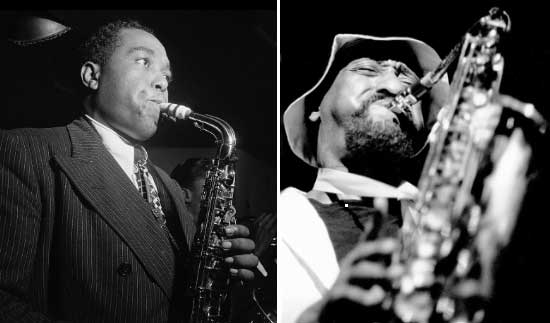How Did “Licks” Become a Four Letter Word?

The advent of social media has allowed me to witness the re-emergence of the phenomena of “lick” haters. The complaint against licks, I think, boils down to musicians sounding uninspired and clinical because their improvisations sound like exercises and don’t illicit a sense of freedom and spontaneity that true art requires. The conventional wisdom is that learning licks leads to this kind of performance. But I couldn’t disagree more.
The Role of “Licks” In My Early Musical Development
As a young musician growing up in the midwest without a lot of access to improvisation instruction, I remember being very frustrated trying to get information about how to improvise in the style of my heroes. I was primarily listening to Miles Davis groups, Dexter Gordon, Charlie Parker and Sonny Stitt. I didn’t have great ears naturally so my first forays into improvisation weren’t very successful. I tried to use Dorian and Mixolydian scales as they were explained to me, but nothing I played sounded like my heroes.
At a summer camp, I was introduced to the concept of learning “licks” in twelve keys and applying them to my improvisations. I liked the challenge of figuring out how to work the few licks I knew into different chord progressions by altering a note or two, or starting the lick a few notes later, or trimming a few notes off the end. I got facile enough that I could even stitch a couple of licks together creating longer sixteenth note lines.
I practiced obsessively and became very familiar with a fair amount of licks and started to gig and play with other players. As far as I was concerned, I was an improviser.
In addition to using arpeggios and some scalar ideas, I was incorporating the licks of Dexter Gordon, Charlie Parker and Sonny Stitt in various combinations with some artistic success.
Judgement From Other Players
When I first got to a school as a jazz major, I was a little taken aback by the idea, espoused by some of my classmates, that learning “licks” was a bad way to approach improvisation. Most of the comments I heard were regarding other players. I didn’t feel criticized directly until people heard me in the practice room. And there I was obsessive – working licks through the keys at various tempos, with varied articulation and swing feel. But there was a lot of pushback from people who heard my process. They’d deride my focus on licks. I wrote off the naysayers and kept working.
When I started teaching a few years later, I’d find myself frequently in front of players who wanted to “get away” from their licks and do more “real” improvising. Usually I’d find that the students with this desire hadn’t really learned licks very well or how to alter them to fit a variety of situations, or how to and get in and out of them with ease, or vary them rhythmically, and use them to make genuine music.
Naturally, their use of licks sounded awkward, preconceived, and worst of all, didn’t swing. One thing that comes from obsessively practicing licks is that you learn to articulate and swing authentically.
Finding Freedom by Learning the Language
What I realized was that they needed was to get more into their licks, using repetition to drive them into the depth of their souls. Playing authentically and with a joyous presence doesn’t require that the melodies coming out of your horn have to be spontaneously conceived, they just have to be masterfully and artistically executed.
The notion that learning phrases too well will stifle your artistry can be disproven by attending a great classical performance. Do you think Heifetz, or Donald Sinta, or Glenn Gould suffered from too much preparation? I believe that in their world of Western European classical music, it is accepted that true freedom comes from intense study and familiarity with the material. I don’t think it’s much different in our world as improvisors.
Most musicians agree that improvising in style of masters like Charlie Parker, Sonny Stitt, Dexter Gordon, Miles Davis, and John Coltrane is a language. We learn this language the same way we learn spoken language.
We learn simple phrases first. We learn sentence construction rules; we learn colloquialisms and conventions of fluent speakers. We imitate what we hear and we increase our vocabulary and complexity. But we never discard what we started with.
The Stigma Against Licks as a Departure from Common Sense
The idea of “getting away from our licks” is equivalent to an English speaker declaring that he or she would like to stop using “the”, “and”, and several key word strings like “want to go to the” or “come up with a” and get to some new stuff.
That just doesn’t make any sense.
Just like language improvement, growth in improvisation is attained by adding to and reworking our basic vocabulary not eliminating parts of it.
I’ve noticed that people try to avoid the term “licks” and will substitute words with less negative connotations like “ideas” or “language.” I have started calling licks “melodies” because that’s what they are. And as a building block for the great improvisations of Charlie Parker and John Coltrane, they probably deserve a more substantial sounding term than “licks.”
Reaping the Rewards
But sometimes I use the word “licks” because I want the student to be clear about what they’re doing and not dodging the rigors of their craft by using more ethereal names. It’s a contrived process, to be sure. To take a ii-V-I lick and apply it on a tune like Ornithology over all the iterations of ii-V-I is not in itself high art, but it can train the fingers to play and the ear to hear the language in a way that will allow the student to find her own voice.
Students who practice diligently like this find freedom rather quickly and start to sound like themselves. Ironically they usually get to a personal style quicker than their peers who are using scales and trying to make every phrase up from whole cloth.
It is truly an ironic phenomenon that students who refuse to imitate the masters all sound the same. Artistry comes from living inside what has come before.
Learn More About Mike and Check Out His Music
Check out his latest album, “Song For All Of Us“:
Performance Videos: Youtube
Official Website: http://mikeleejazz.com/
Facebook: http://www.facebook.com/mikeleesax/
UPDATE: Since this article came out, there has been a rebuttal by saxophone heavyweight, Danny Markovich of the band, Marbin. Check it out here if you haven’t done so already.






March 21, 2019 @ 12:37 pm
Amen to that…
March 21, 2019 @ 7:11 pm
Great article ….
March 21, 2019 @ 8:39 pm
I wholeheartedly agree with everything in this article.
April 2, 2019 @ 11:07 am
Agreed. After all, aren’t even scales and arpeggios, in a sense, “licks” as we learn them as patterns and practice them to get proficient with them? We just do it with scales and arpeggios to the point they’ve become a part of us. Nothing wrong with this approach that I can tell.
Good article, for sure
April 7, 2019 @ 3:30 pm
Great article. I read the opposing article and I agree w/you. I really l like the comparing jazz improve to a language approach. However you must LISTEN to the language in order to play it.